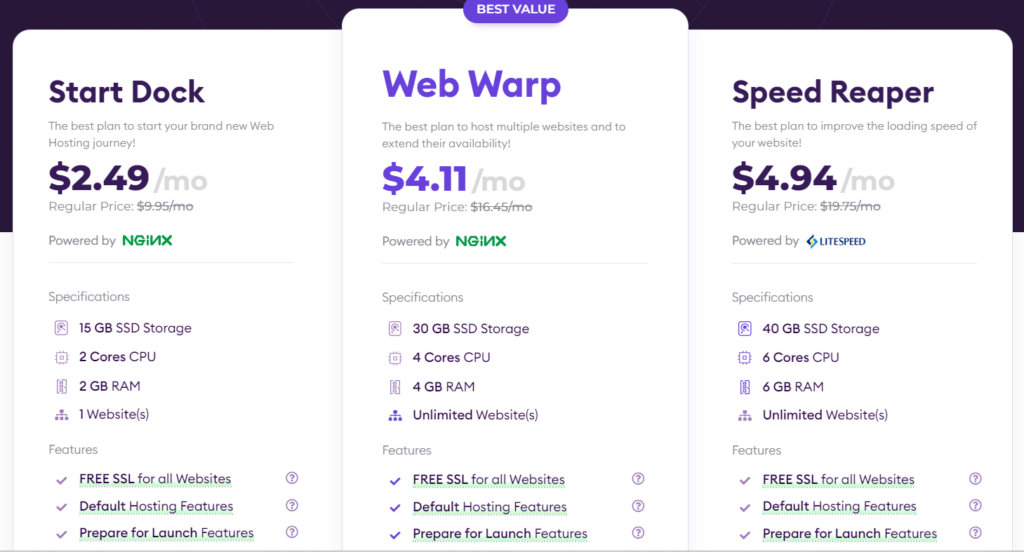If you’re launching your first website, you’ve probably been informed you’ll need shared hosting. But what does “shared hosting” mean?
Without web providers like HostArmada, which provides feature-rich shared hosting plans, launching a website would require advanced technical expertise and a strong infrastructure. Instead, these services make it extremely affordable and simple.
Web hosting in general is in high demand, with the global hosting services market anticipated to reach $252.4 billion by 2030, according to Global Industry Analysts.
Shared hosting is a popular web hosting option because it is both efficient and cost-effective. According to Grand View Research, shared hosting contributed to 37.64% of total hosting revenue in 2019.
If you are just getting started, shared hosting is usually the best option. However, it is not suitable for everyone.
Let’s look at the advantages and disadvantages of shared hosting services.
What is shared hosting?

Starting a website is easier than it once was, but it might still be intimidating if you’ve never done it before. Shared hosting is extremely popular for this reason, as it is the most accessible type of hosting for novices.
But how does shared hosting affect you in practice? Shared hosting is user-friendly, economical, and an excellent starting point for a new website.
However, you may have heard some concerns about its downsides, such as its slowness, restrictions, and security risks.
While there is some truth in this, shared hosting does not have to be slow. Finally, it all depends on the quality of the web host you choose.
How does shared hosting work?
Shared hosting involves hosting multiple websites on the same server. Physical server resources such as memory and bandwidth are shared by dozens of websites, as are database and email account servers.
You might assume this wouldn’t work, but as long as no website consumes too many resources, sharing a web server will never be an issue.
Shared web hosts typically apply limitations to prevent any one website from hogging bandwidth or disk space, as well as to increase security, so that malware does not spread between websites on a shared server.
Other types of hosting include private servers that you do not have to share, but they are more expensive and frequently include features that a beginning website does not require, such as root access to the server.
Advantages of Shared Hosting

While shared hosting is sometimes criticized for being slow and unstable, modern web providers such as Bluehost have improved servers, added security features, clearer control panels, and expanded resources for all customers.
Let’s look at the benefits of using a shared hosting package.
Shared hosting is affordable.
Because multiple websites can exist on the same server, shared hosting is extremely inexpensive. Starting a website costs less than $5 per month, making it affordable to practically anyone. They’re frequently combined with a free domain name.
If you’ve ever wanted to establish a small business, publish a blog, or release a personal project, shared hosting makes it completely affordable.
Shared hosting is accessible.
Even if you’ve never had a website before, most shared hosting plans include a variety of tools to help you get started.
For example, HostArmada shared hosting plans include one-click WordPress installation, which significantly simplifies the process of creating your first website.
Furthermore, the server configuration is handled for you, allowing you to focus on developing your new website.
While advanced hosting alternatives like dedicated hosting may require more technical knowledge to administer, most shared hosting packages include control panels such as cPanel or specialized ones such as HostArmada. These allow you to update important server settings using a simple UI.
Shared hosting is easy to use
Shared hosting options are managed, which means that the web host handles technical support and server administration. Running your server is a demanding effort, but a shared hosting package simplifies the process and is generally more user-friendly.
Setup, software installation, server updates, and hardware upgrades are all handled for you, allowing you to focus on expanding and generating traffic to your website.
And if you use WordPress, you don’t need coding skills to create a website. Everything can be set up easily using WordPress’s interface and your web host’s control panel.
Many shared hosting providers provide website builders, so you don’t even need design skills to create a visually appealing website.
Bluehost’s WonderSuite, for example, is included with all shared plans and will help you through the process of creating and designing a website.
Shared hosting is user-friendly.
Shared hosting solutions are quite user-friendly. The web host handles all of the technical aspects of server management, so you don’t have to bother about them.
This means that the hosting provider handles everything from server setup to software installation, server updates, and hardware upgrades.
With shared hosting, you can focus your efforts on what matters: expanding your website and getting more people.
Shared hosting supports multiple domains.
Shared hosting enables you to host numerous domains from a single hosting account.
This capability is very useful if you manage many websites or projects.
You can manage all of your domains from a single control panel, streamlining the administration process and saving you time and effort.
Shared hosting offers security.
Security is a vital consideration for any website owner, and shared hosting does not disappoint in this area.
Hosting providers invest in strong security measures to protect their shared hosting servers. They frequently use firewalls, regular security upgrades, and malware scanning to keep your website safe and secure.
Furthermore, the shared hosting environment is monitored for any suspicious activity, which helps to prevent security breaches.
Disadvantages of shared hosting

While shared hosting is an excellent choice for most new websites, it is not appropriate for everyone. Several factors make it less than optimal for some websites and projects.
Technical restrictions

While it is not essential for most websites, many shared hosting plans contain tight usage policies and technological limitations.
While these are understandable to keep other websites on the shared server secure and prevent server-wide slowdowns, they can render certain projects ineffective.
For example, if you wish to install server software, run a different operating system, or modify other advanced technical settings, you should use a virtual private server (VPS) or dedicated server, which provides more control and customization than shared hosting services.
Some shared hosting imposes restrictions, such as a low PHP memory limit, which can interfere with some WordPress plugins. Bluehost’s default memory limit is 256M, while some hosts set it as low as 128M.
Some hosts exclude specific plugins because their existence may jeopardize a shared hosting environment. These plugins may potentially replicate existing functionality or consume excessive resources, putting a load on the shared server.
Finally, if you start using up too much bandwidth or storage and slowing down other websites, you may need to increase your account.
Exceeding your plan’s bandwidth limits regularly can cause your website’s speed to be “throttled” or severely broken down. In extreme instances, you may incur overage costs or have your account suspended.
Your shared hosting plan’s limits will vary depending on your chosen provider.
Performance and security concerns
While hosting on a single server keeps prices low, it also means sharing the resources that power your website with dozens of others.
It is usual for your website to be slightly slower than if you had a dedicated server; however, a professional host should give adequate speeds.
However, if one website experiences a traffic spike or exceeds its permitted resources, all websites on the server may be affected. Similarly, if one website is infiltrated by malware, all others may become filled.
Finally, sharing an email server with a website that frequently transmits spam may result in your emails ending up in the spam bin.
Good hosting companies will handle any shared-environment difficulties, such as slowing problematic websites, blocking spammy websites, and helping you in removing malware from your site.
Minimal scalability.

Shared hosting solutions are scalable up to a point. In general, the host will provide different shared plans, some of which provide limitless bandwidth and storage. The hosting business and provider will determine the particular limits.
However, when your website increases in popularity, you may want to consider switching to a different sort of website hosting, such as a VPS or dedicated server. Both hosting solutions can better meet the needs of growing enterprises because they can manage higher traffic from the start.
The good news is that if you continue to use the same host, changing plan types is straightforward. Bluehost has a variety of hosting options that you can quickly upgrade to if your website grows over a shared hosting plan.
Decrease website speed.
Shared hosting means that you share server resources, such as CPU, RAM, and bandwidth, with other websites hosted on the same server.
As a result, during peak traffic periods or when nearby websites are experiencing significant levels of activity, your site’s loading speed may slow.
This can result in a less-than-ideal user experience, particularly if your website relies on speedy load speeds.
Possible server crashes.
Shared hosting servers may occasionally experience downtime or breakdowns for a variety of reasons.
If one website on the shared server has a sudden rush in traffic, it can influence overall server performance and even cause server breakdowns.
While hosting companies aim to reduce such incidents, they are possible in shared hosting environments.
What features should you search for in shared hosting?
When choosing a shared hosting company, you must examine several important elements to guarantee that you get the best value and performance for your website. Here are the key features to look for in shared hosting:
- Storage Space: Assess your website’s storage requirements. Shared hosting services typically provide varied amounts of storage capacity. Make sure the hosting company provides enough storage to accommodate your present website’s content as well as any future development. When estimating your storage requirements, take into account photographs, movies, and more files.
- Bandwidth: Bandwidth is the quantity of data that can be moved between your website and its users. Choose a shared hosting package with enough bandwidth to accommodate the predicted website traffic. It is critical to avoid plans with bandwidth constraints, which can result in delayed loading times or overage costs if you exceed your allotted bandwidth.
- Easy-to-Use Dashboard: An easy-to-use control panel or dashboard is required for managing your website, domains, email accounts, and other hosting capabilities. Popular control panels such as cPanel or Plesk are frequently available with shared hosting plans, making it easy to set up and maintain your website without requiring sophisticated technical skills.
- Database and Programming Language Support: Determine whether the hosting company supports the database systems and programming languages that your website requires. For example, if your website is constructed using WordPress, make sure the host supports PHP and MySQL. Check compatibility with any other online applications or frameworks you want to utilize.
Who Should Use Shared Hosting?
- Beginners and small businesses: Shared hosting is a fantastic option for those new to website hosting and management. It’s easy to use and doesn’t require a lot of technical knowledge. Small enterprises, startups, and personal websites with restricted budgets might profit from the low cost of shared hosting.
- Websites with low to moderate traffic: Shared hosting may handle the load properly. This includes personal blogs, portfolio websites, educational websites, and small online enterprises. Shared hosting offers sufficient capacity to serve these types of websites efficiently.
- Budget-conscious individuals: Individuals with limited funds might consider shared hosting plans, which are often the most economical hosting choice. If you’re on a tight budget and don’t need advanced features or a lot of server resources, shared hosting can help you build an online presence without breaking the bank.
- Non-technical users: Shared hosting is intended for users without extensive technological abilities. Many hosting companies feature user-friendly control panels such as cPanel or Plesk, allowing you to easily set up and administer websites, domains, and email accounts without the need for coding or server administration knowledge.
- Static or light dynamic websites: If your website is mostly composed of static content, such as text and images, or if it contains lightweight dynamic features, shared hosting is appropriate. Websites with complicated, resource-intensive applications may benefit from more advanced hosting solutions such as VPS or dedicated servers.
Is shared hosting right for you?
If you’re confused about how to choose the best shared hosting services, here’s a list of things to think about.
- Resource requirements: If you anticipate having a lot of traffic right away, needing a lot of storage space, or developing a RAM-intensive application, shared hosting is certainly not for you. However, if you’re just starting with a modest website, shared hosting will work fine.
- Technical requirements: Shared plans include many constraints to ensure that websites on the same server remain separated. If you require root access to the server or wish to perform anything more complex, choose a different type of hosting. If not, shared hosting provides a simple “in” to becoming a website owner.
- Speed and uptime: If you choose a problematic provider, shared hosting may be slow. Make sure to do your research and choose one with a proven track record of delivering consistent uptime. As a result, you should not experience any serious issues with website speed or uptime.
- Security: Sharing a server with unknown websites raises security risks. A competent web hosting service would prioritize security so that breaches are extremely unlikely. Unfortunately, there is no way to eliminate the risk. If you host confidential data, you should consider using a more secure hosting service. Even yet, security is a minor concern with a reliable host.
- Scalability: Shared hosting is ideal for hosting a small personal website that you don’t intend to grow significantly. Personal portfolios, hobby blogs, and even specialized web shops can thrive with shared hosting. Otherwise, you will eventually outgrow your shared server and need to migrate. Sticking with the same web host allows you to easily upgrade your subscription.
Remember that shared hosting is adequate for the majority of websites. And if you do run into constraints with your plan in the future, you can always change to something with more control, such as VPS hosting, if necessary.
Alternatives to shared hosting: Consider cloud hosting.
When considering an alternative to shared hosting, it’s important to understand what cloud hosting is and how it differs from shared hosting.
Cloud hosting: Flexible and scalable.
Cloud hosting uses a network of virtual servers that access an underlying pool of physical resources. It’s ideal for firms with unpredictable traffic or those looking to expand quickly. The highlights of cloud hosting include:
- Scalability: Resources may be dynamically modified to meet your website’s traffic demands, making it ideal for growth and high-traffic events.
- High reliability: Using many servers decreases the possibility of downtime; if one fails, another may immediately take its place.
- Performance efficiency: Cloud hosting is more efficient than shared hosting in handling large traffic and intensive workloads because resources are distributed across multiple servers.
The choice between shared and cloud hosting should be based on specific criteria such as expected traffic, budget limits, performance requirements, and scalability needs.
Shared hosting is perfect for people who are just starting and have modest technological requirements. Cloud hosting, on the other hand, is great for businesses seeking a robust, scalable, and dependable hosting solution that can adapt to their expanding business needs. This option ensures that your website is well-positioned to run optimally and satisfy the needs of your visitors or clients.
HostArmada provides reliable Managed Shared Hosting for new Users.

You can choose from the following cloud hosting web hosting plans:

For further reading:
- What is Web Hosting? Discover Types, Key Factors, & 2024’s 12 Best Web Hosting Platforms.
- The Ultimate Guide to Cloud Hosting: What It Is, How It Works, and When to Use It.
Common questions about shared hosting
How does Shared Hosting differ from other hosting types?
Shared Hosting provides cost-effective and user-friendly hosting by allocating resources among several websites, assuring affordability without losing quality.
Can I upgrade from Shared Hosting to another hosting type later?
With Bluehost, the answer is yes! As your website grows, seamlessly upgrade to more powerful hosting packages to ensure continuous scaling. Check out this informative video on how to upgrade accounts later.
Is Shared Hosting Good for Blogging?
Shared hosting is perfect for bloggers. Enjoy quick load times, simple installation, and powerful tools to bring your content to life.
Is shared hosting expensive?
Shared website hosting costs typically start at $2 to $5 per month and increase to $10 to $30 per month when renewed. Some companies, such as SiteGround, charge up to $45 a month for higher-tier shared hosting services. In shared hosting, multiple websites share a single server’s resources, such as processing power and bandwidth.
Is shared hosting Slow?
Your website is on a shared hosting plan.
If you choose a shared hosting package, your website may slow down during traffic spikes. You and other websites share the same web server and resources, such as bandwidth, CPU, and RAM.
Final Thoughts: What is Shared Hosting? Pros and Cons Explained
While shared hosting is not suitable for all types of websites, it will do the job well for the majority of them.
It is ideal for small and medium-sized websites, but may not have enough resources for larger ones.
Shared hosting has some limitations and issues with long-term scalability, but it compensates for them by being cost-effective, accessible to beginners, and simple to use thanks to the variety of tools included in most web hosting plans.
The minor downsides will be further minimized if you remain with a dependable and feature-rich web host like HostArmada.
Bluehost provides shared hosting, which is ideal for novices who want to rapidly get their new website online. Our shared hosting plans include 24/7 customer support, automatic malware scans, and WonderSuite for seamless WordPress installation and customization.

